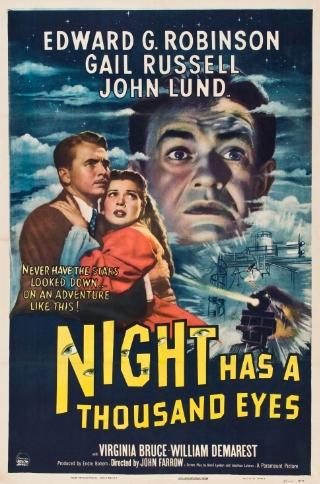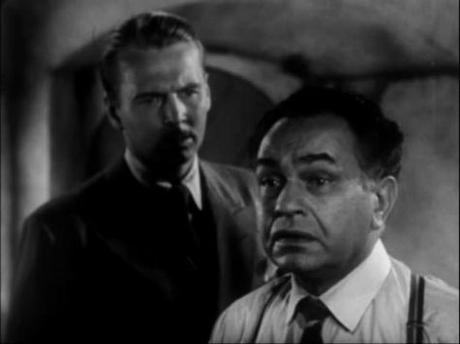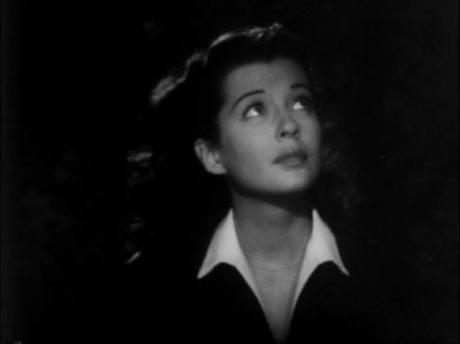
I’d become a sort of a reverse zombie. I was living in a world already dead, and I alone knowing it.
Film noir is at heart a fatalistic genre. Greed, stupidity, desire and deceit all play a significant part to be sure, but back of it all is the implication that human beings are locked on a predetermined path which circumstance or fate has chosen for them. Whether or not one subscribes to such a theory is neither here nor there; it’s enough to know that it underpins much of film noir. But what if we already knew what lay in store? Would it be possible to cheat fate and regain control of our lives? That’s the basic premise of Night Has a Thousand Eyes (1948), a noir with a quasi-supernatural slant.
The film opens dramatically with Jean Courtland (Gail Russell) about to take her own life by throwing herself in front of a train. The suicide bid is thwarted at the last moment by Elliott Carson (John Lund), her fiance. But why would a beautiful young woman such as this want to end it all? The answer to this is provided by John Triton (Edward G Robinson), once a small-time mind reader and now a virtual recluse, a prisoner of his own unique talent. Via a series of flashbacks Triton reveals his connection to Jean and the odd events that have shaped his life. Depending on one’s point of view, Triton has either been blessed or cursed with the ability to foretell the future. As his weary narration points out, there were initial advantages to this, such as the knack of predicting how best to make money. Despite these indisputable benefits, Triton gradually came to see that prior knowledge of various tragedies had a corrosive effect on the soul. Slowly, the feeling began to eat away at him that he might be in some way responsible for some of the things that happen. His first reaction was to ignore the premonitions in the hope that doing so might avert them. When that doesn’t work he settles on an alternative course of action; he will actively try to prevent the outcomes that periodically flash before his eyes. And it’s this which leads him into the life of Jean Courtland. Jean is the daughter of his late fiancée, a woman he left and let marry his best friend. That sacrifice failed to save the life of his former love, but a vision of Jean’s imminent death routs him out of self-imposed exile. For twenty years Triton has hidden himself away from the world, shunning human contact. Now however, he decides to take on fate directly. It’s a duel of sorts between a desperate man and the mysterious force that seems to determine all our futures. The prize at stake: the life of a young woman, and the chance for Triton to shake off the unwelcome curse bestowed upon him.

John Farrow is a director I’ve always had a lot of time for. He was extremely versatile, working in a variety of genres and turning out a handful of highly entertaining and well crafted noir pictures. Night Has a Thousand Eyes is a brisk piece of work, yet there’s also a dreamy, melancholic feel to it. The first half is taken up with the flashbacks that explain how Triton’s gift mutated into a curse, and Robinson’s voice-over adds to the noir atmosphere. The latter section sees the focus narrow and is largely confined to Jean’s home, as the police, various retainers and Triton all gather to see if the predictions come true. The fusion of noir motifs and supernatural overtones is unusual and quite successful in my view. While film noir was grounded in at least a superficial reality, there was also an element of the fantastic running through it. I guess the fact this movie was based on a Cornell Woolrich novel, given that writer’s penchant for outrageous and sometimes bizarre plot twists, accounts for this mix. Another point of interest is the sympathetic or tolerant stance adopted towards the whole issue of spiritualism. Generally, film and literature of the 30s and 40s tended to be downright hostile when it came to examining the spiritualist craze that grew out of the aftermath of WWI. Most books and movies focused on debunking the techniques of the fake mediums and phony spiritualists, exposing them for the charlatans they were.
While Farrow’s direction is solid and Woolrich’s material is always interesting, it’s the performance of Edward G Robinson that really powers the film. By his own admission, Robinson possessed an air of menace that was often used to great effect. Yet, in reality, Robinson was a highly cultured man and could impart great sensitivity when he was afforded the opportunity. The role of Triton was such an opportunity, a tortured soul robbed of the love of his life and endowed with a terrible gift. Robinson had wonderfully expressive features and it’s a real joy to see him tuck into a meaty and complex part like this. Although he’s the unquestioned star of the movie, he gets good support from John Lund and Gail Russell. Lund’s role is a bit of a thankless one as the stoical, skeptical romantic lead, but he does all that’s required of him. Russell had that tragic, ethereal beauty that works so well on screen and there’s a vague air of confusion about her, a sense of one lost in the world. Somehow, her magical presence seems entirely appropriate in such a film.

Night Has a Thousand Eyes is a movie that’s just crying out for a decent DVD release. The film can be viewed online quite easily and there’s a DVD available from Italy but neither option shows the movie in the best light. I have that Italian disc and it has to be said the print used is pretty beat up. It’s taken from an Italian source, the titles and credits are presented in that language, and it’s a dirty, scratchy affair. Despite the poor condition and lack of restoration it does remain perfectly watchable throughout. The disc offers the choice of either the original English soundtrack (no subtitles) or an Italian dub. The theatrical trailer and a text essay (in Italian) comprise the extra features. This was originally a Paramount production so, given the lack of any word of Olive releasing it, I’m guessing the rights now reside with Universal. I can only hope that it gets a stronger release somewhere in the future – it deserves it. Regardless of any complaints about the current presentation and availability of the movie, it remains an intriguing film noir. A neglected little gem, ripe for rediscovery.
